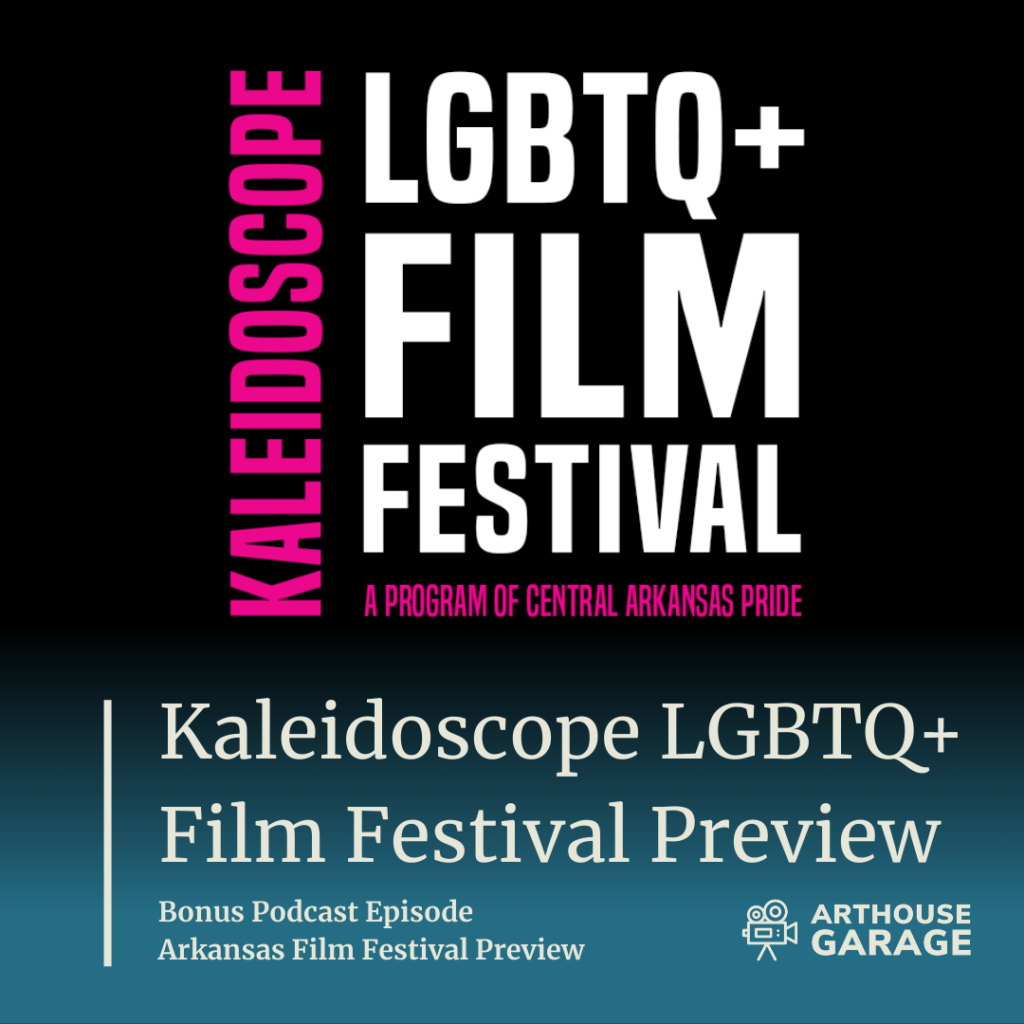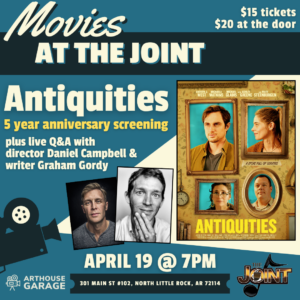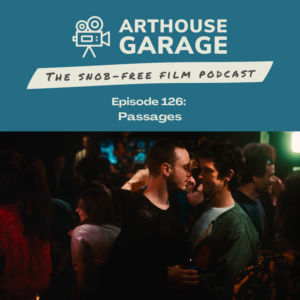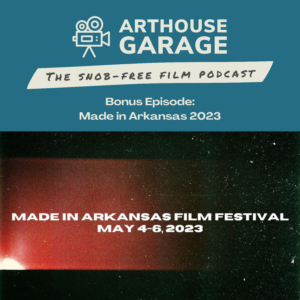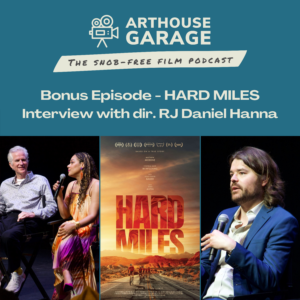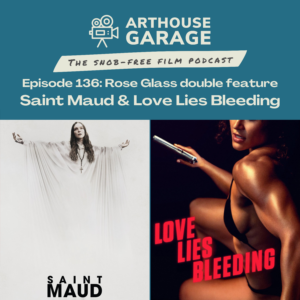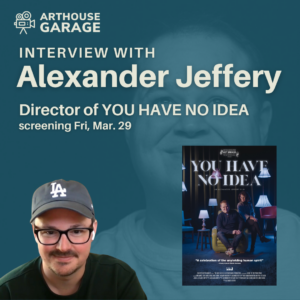Read the transcript below:
Andrew Sweatman 0:09
Hello, hello and welcome back to art house garage, the snob free film Podcast, where we make art house indie classic and foreign cinema accessible to the masses. I’m your host Andrew Sweatman, and today we’re bringing you another bonus episode at our house garage. We love to help people connect with challenging cinema. But we also love to support the local film community here in Arkansas where the show is based. With that in mind, we’re bringing you a film festival preview for an annual festival that takes place right here in Central Arkansas. The festival is the kaleidoscope LGBTQ plus Film Festival coming up November 5 through the eighth. Here’s the festival description from the website says Kaleidoscope is a celebration of LGBTQ plus films, filmmakers and stories whose mission is to provide innovative and unique programming that will engage the hearts and minds of audiences in the state of Arkansas and the surrounding region. I am thrilled to be joined today by kaleidoscopes Executive Director Zack Baker and festival director Cameron Vaughn, Zack and Cameron. Welcome to the show. And thank you both so much for joining the podcast today.
Zack Baker 1:11
Thanks for having us. So yeah, my name is Zack. I am the Executive Director for a Central Arkansas pride which produces the kaleidoscope LGBTQ plus Film Festival. And then of course Cameron is our festival director.
Cameron Vaughan 1:24
Yeah. Thank you. Thank you so much for having us today. Andrew, we’re really excited to be here. Absolutely.
Andrew Sweatman 1:29
I’m thrilled that we could get in here and talk about the festival, you know, so this is the sixth year for Kaleidoscope and I feel like the festival has kind of grown in popularity each year seems to be a lot of buzz in my circles about the festival and like just the quality of films that you bring each year. But for people who don’t know about Kaleidoscope can you tell us about the festival? how long it’s been around, and kind of what sets it apart from other festivals.
Cameron Vaughan 1:51
Yeah, so this is our six year for the kaleidoscope Film Festival. And it’s gone through to through some changes over the last few years. So this is actually our second year doing the film festival under the the Central Arkansas pride umbrella. So, you know, so that’s been really a great experience to partner Kaleidoscope with Central Arkansas, probably because they have such a great mission. And they align really well a lot of ways like that. So, so yeah, so this is kind of our second year doing it, and in this format, was Central Arkansas pride, and it’s going gone really well. And this is our first year doing virtual. So we’re excited about that as well. I mean, you know, we all also wish we could be in person, but hopefully we will be in, you know, in in the near future. Yeah,
Zack Baker 2:38
you know, two years ago, when we were approached about Kaleidoscope, you know, it naturally felt like a really good fit for, and we were really excited to be able to bring this, continue bringing this festival to Central Arkansas, it’s you know, to us, it’s really important that we’re able to tell stories and stories that relate to people, and that we have our experiences shown on the big screen. Because, you know, if you lived in LA or New York, you know, you oftentimes, you know, have the opportunities to go see those on the big screen. But here in Little Rock, you know, that’s not usually the case. And so now our mission is to really get out there and, you know, a raise awareness about LGBTQ plus issues, but then also to help people you know, to be able to experience themselves on the screen to see their stories, and to build a really strong community here in Central Arkansas.
Andrew Sweatman 3:32
Yeah, that’s great. And your representation has proven to be so important. And I think this is, especially in the south here. I think it’s really a great thing. Well, you mentioned that it’s going to be virtual this year, it would be you know, because 2020 has been the way it’s been. So yeah, tell us about the virtual format, how, what, what platform is it using? And how can people tune in?
Cameron Vaughan 3:49
Yeah, so the platform we’re using this year is called adventive. And, and so it’s been a real interesting process, just going from, you know, in person event to a virtual Festival this year. You know, it’s it’s been a, you know, a learning curve for all of us. And we’ve all just had to jump in and learn and figure out how to do not just this film festival, but also our, our pride festival that we did a few weeks ago, we did that virtually as well. Yeah, so it’ll be on a big team. And the easiest way to find it is just through ar pride.org. And that takes you to our home website. And then you can follow the kaleidoscope link from there, and it’ll take you directly to our films. And one of the things we’re really excited about this year is we are offering these films free of charge. And for us that was really important to do this year. You know, it just we wanted to reduce any barriers of entry for people in the community so that they could they could share in these films and these experiences as well. So just keeping that cost down, keeping those barriers down so that people can enjoy the films that may not you know, otherwise be able to, to to buy a ticket or pass Can can enjoy that that experience as well. So yeah, I mean, the easiest place to check out the the films and the lineup is aarp.org. And we have all the features listed there, I’m still working on getting the shorts uploaded to the platform. So that’s that’s my big chore today. But, but the features are in there, they’re ready to look at and, and start previewing watch trailers, and all that good stuff.
Andrew Sweatman 5:24
Yeah, that’s great. I’ve used event TV, a couple other festivals, and it works really great. And you can put it on your streaming box or on your phone or whatever. So I think that’s it’s been a, an important tool, especially this year, as so many things are going virtual. So yeah, it’s pretty seamless. And I really have been happy with it. Well, you mentioned the lineup, let’s talk about that lineup. So right now, what I’ve seen listed is there’s 10 features, I’ve only seen one of these so far. And I’ll go and mention that because it’s portrait of a lady on fire. We don’t have to talk too much about that one, because I’d like to highlight some of the kind of the lesser known stuff, but I’ll say portable ad on fire is absolutely worth all the hype, all the awards that one last year, it’s really exquisite. And now people have no excuse, you can tune in for free. So I’ll highly recommend that one. But what else is showing that you guys are excited about?
Cameron Vaughan 6:12
Yeah, we you know, we’re pretty excited about our lineup really excited about, you know, portrait of a lady on fire too. For me personally, it’s one of my favorites. And that’s why we, we made the decision to go ahead and show it this year, you know, and another big part of Kaleidoscope and just, you know, doing the festival here in Central Arkansas. And I think a big part of of these films and showing them and having them is to bring attention to them, you know, that otherwise may not get attention here in Central Arkansas and awareness here. And so, for us, that’s why it was important to to show that one this year, you know, that being a you know, you know, it came out last year, but we went ahead decided to show that one as well. But, you know, I’m really excited about all of our films here. But
Gosh, where to start.
Andrew Sweatman 7:03
And we can do all of them if you want the
Unknown Speaker 7:05
right time.
Cameron Vaughan 7:08
I think pure kids to me is is really interesting, it’s really, really good. And and we’re doing a screening of a Paris is burning as well. And, you know, if you get a chance to kind of watch both of those films, you know, if you can you sit down for a day and digest both of those in a day, I think they they complement each other really well. Because they focus on a lot of the same subjects, but they’re 30 years apart. So it’s really interesting to see how much has changed, and how little has changed for for some of these communities that are that are documented in those films. So, you know, really, they do focus on very similar document very similar communities, which is the, you know, they’re living on the edges of society in Manhattan in New York. And so these are a lot of people who are living on the streets who are homeless that have, you know, come from, from other areas. And so and they’re, and they’re largely people of color. So they’re, they’re people who, you know, have really been, you know, on the outside of society in terms of, you know, they weren’t accepted in their homes, they weren’t accepted in their communities. And so then they have been kind of pushed out of their homes out of their communities, and in a lot of ways, and so they find themselves in their new families and their new house. And both of these kind of highlight these new homes and these new families that that are being built in this kind of same community 30 years apart, so that I thought that was really cool. That was really interesting.
Andrew Sweatman 8:44
Yeah, and those are both documentaries. Is that right? Yes, yes, we’re seeing kind of real true life stories. And yeah, and we mentioned representation being so important, and I think cinema in particular is so good at kind of driving empathy. So I think it’s the perfect, perfect tool to to highlight these kinds of stories. Yeah,
Cameron Vaughan 9:03
yeah. And pure kids is one that’s, you know, this year that Paris is burning was was 1990. So, we did have the chance to come sit down and visit with the director of pure kids elegance and so that, I’m telling you, elegance did not hold any punches in this bill. And it was just so interesting to see. see a lot of these relationships and the way that people are coping and surviving, and how they’ve managed to, to continue to live and, and things like that. And it really hits hard on some, some very powerful subjects. And, and so I just thought, I guess did a really good job of highlighting those things. And, you know, and being able to show those things, you know, everything from you know, what it’s like to live homeless on the streets of New York and, and I mean for some of these people, I mean, you wouldn’t believe some The things that they would consider and think about doing, just to be able to get off the streets, it’s unreal, and the ways that they’re surviving. And then elegans also did a really good job of showing some of that family dynamic. So he followed one of the subjects, or participants as well, I guess likes to call them, he bought one of the participants back to their home in, in Kansas City, I believe it was, and, and you got to see her kind of interact with this family that absolutely was not on board with her transition. And, and they would talk about her right in front of her face with her in the room and say, these these crazy things. And it, it it just highlights kind of that, you know, that family dynamic. And, and I think it’s something that’s just very real to a lot of people in the LGBTQ plus community in hits home with the way elegance was able to do that. And to show that I thought was, was really well done. But yeah, so definitely check out pure kits, and then check out Paris is burning, because that’s going to be a lot of the same community a lot of the same thing. It’s, but it’s from 1990. And you see these, these people, they come from, you know, all over the country, from communities and families that have not accepted them. And they found a new home, they found a new family there, they’re in New York, even though you know, a lot of it is you know, living on the streets and so forth. But but it’s their home and their family. And that’s, you know, that’s kind of what it’s about there, huh? Yeah.
Andrew Sweatman 11:34
Yeah, though, some really fascinating. One of the other titles that only one that actually had heard much about otherwise was in then we danced, which I’ve heard a lot of buzz from, you know, winning a bunch of festivals in the last several months. Is that a French film? Is that correct? It’s a it’s from
Unknown Speaker 11:49
Georgia.
Unknown Speaker 11:52
So
Cameron Vaughan 11:53
it’s, it’s got a lot of influence it’s in, in the eastern part of Europe. So you hear a lot about Russia, and Ukraine, and those are all little subtext, you know, all the little things that are kind of going on in the background and make a dad talks about, Well, where’s the Russian border going to be at today, you know, something like that, but know that film is really good, really powerful. You have a character who’s, you know, trying to make a go of it at it at a traditional dance and a traditional theater that they have in their country, and he’s in his family lineage, so that you find out his parents did it and now he and his brother doing it, and, you know, his brother’s, you know, not that committed to it, but, but your main character is, and he’s all into it. And, and, but, and working really hard in it. And so, at that point, we get the disrupt it’s a new character comes in, and then you get to see kind of their relationship built with this, this other male dancer that that joins their group and, and you get to kind of follow their relationship as it you know, starts and, and, and that sort of thing. I don’t want to give too much away and kind of tiptoe around something without
Andrew Sweatman 13:20
spoilers. Yeah,
Cameron Vaughan 13:21
yeah. Yeah, for sure. But it’s just, it completely throws his life off balance, the introduction of this, this new character, and the dance troupe, and, and you’ll fall fall in love with the main character. He goes about it his own way, he does it his own way, in a very traditional society that values a long line of tradition, and, and things like that. So. So it’s a really powerful film, and the dancing and the music is great. And you really get a taste for that Gregorian culture. So it’s really good, though.
Andrew Sweatman 14:00
That sounds really great. You know, I yeah, so I heard about this one, just a few months ago, I think and heard it praise really highly. And it was one that i thought you know, it probably like a year or more before I’m able to see it. So I was thrilled that it was on the list, I’ll get to watch it much sooner. So that’s really exciting. And from the comfort of my own home, which is even better. And then one other that I want to ask you about, again, we can talk about as many of these as you want, but one that I saw the trailer for on your Facebook, which is called breaking fast. Which so that’s about a Muslim, correct and kind of his family dynamics. Kelly about that one?
Cameron Vaughan 14:33
Yes. Um, it is it’s about a Muslim and it’s, it’s about the you know, it’s more about the main character so the backdrop with his his Muslim family is very interesting. It’s, you know, you expect would expect that to be the source of conflict in this film. And it’s really not, um, he’s very fortunate has a very loving and accepting family and mother and, and things like that. So his conflict more comes from his love. Life and so you know, the beginning of the film he has, he’s dating this person and, you know, that doesn’t work out. And so, uh, so then after that, it’s a lot of soul searching, and he’s searching for himself who he is, and, and that sort of thing. And then of course, you know, someone comes along and instills his heart, but he has to really reconcile a lot of things with his own own self and the way, you know, he views the world and how he handles things versus, you know, with, with his new new lover and, and so they kind of have, you know, had to come to terms with a lot of things and, and they both have a lot of pain in their past that they have to deal with. And they, you know, they deal with them in different ways. And so that kind of thing is a lot of the source of conflict between the two characters. But it’s really beautiful, very well done, I, you’ll fall in love with all the characters in this film, even the supporting cast, there’s not a character in this one, that you’re not just going to smile and take, take joy away from. And, you know, I thought they did such a good job on it as well, in terms of, you know, you get to see so many different perspectives. You know, religion and its role in, in, in the queer community and how, you know, people in the queer community a lot of times have been been hurt by religion and or scarred by it. And so you see that, you know, with with some of the characters in the film, and then your main character is actually really devoted and, and really reverent of the, the Muslim religion and so but he’d been has other Muslim friends that he’s friends with that have been really hurt by the religion and, and carry a lot of baggage and so. So you get kind of a lot of that context in there and a lot of that real life struggle that I think a lot of people in, in the queer community go through that just that, that how to reconcile your religion, your beliefs, your faith with your sexuality, and and what does that mean? How do you reconcile that? How do you deal with that? And we all have different ways, different approaches. So it was it was really cool to see how they tackled tackle those issues in this movie.
Andrew Sweatman 17:10
Yeah, I’m really excited to catch up with that one, too. It looks it looks really good. All right. So that’s, that’s features. That’s just a taste of a few of those features. There’s even more if you want to go to the website, you can see all of those, which I’ll link in the show notes. But yeah, what about short films? How many are there? And do you want to tell us about any of those?
Cameron Vaughan 17:27
Yeah, so we’ve got an awesome shorts lineup this year. Really excited about it. And I think we have about 30 shorts or almost 30? So yes, it’s going to be be really cool. And we’re going to break those down into some blocks and have several different blogs. So you can kind of digest digest those and you know, and, you know, a handful bite sized formats. But yeah, so we’re really excited about these, trying to think of a couple of highlight here. You know, for me, I love to laugh. I’m a comedy person. So I’m really excited about our comedy block. Let me see here. I don’t want to give too much away because they’re so funny. They’re so good. Oh, um, you know, there’s one. That’s, that’s called Poulter. And so, you know, kind of like Poltergeist since it’s Halloween. we’re referring to Halloween. I guess.
Zack Baker 18:27
So, but Oh,
Cameron Vaughan 18:29
it’s been a while since I’ve seen it. You know, I got to see that one. I was fortunate enough to be able to, to see a lot. A lot of films at the the wicked queer Film Festival A while ago, and this was one of them. I was like, Oh, we have to show this. But it it’s about this guy who’s who’s in the closet. And and oh, gosh, but I mean, the closet comes alive doesn’t exactly get it. It either forces him out.
Zack Baker 18:58
Yeah, the closet comes a lot. And really it’s it’s kind of a manifestation of like, his internal struggles. And so we know it’s it’s a really interesting short film. It was one of my favorites. That we programmed.
Andrew Sweatman 19:14
Yeah, so it’s like a horror horror comedy kind of thing. Yes. Yeah. I love that. You know, I think the best for kind of takes those fears and put some some supernatural spin on it. So I’m excited. That sounds really great.
Cameron Vaughan 19:28
Oh, and there’s another one. It’s called When in Rome and I really, really loved this one. And I it’s probably one of my favorites. It was, you know, you have those films when you program films that you when you just see it you like that’s it. That’s one, you know, it’s it. And that was one for me. It’s called When in Rome. It’s real short, you know, it’s only 1011 minutes. And it’s about this guy and he’s, he’s traveling home. He’s He’s from Rome. And and he’s got a father who’s you know, very masculine, he’s a butcher, and so on and so forth. And so he’s traveling back home for a family event, and he’s bringing his boyfriend along with him. And so it really sets up the stage for this very traditional conflict of, you know, bringing the the queer partner home with you in a very traditional setting. So it really plays up on that, and then gives you a good twist at the end, that you’ll appreciate the chill laugh and, and so it plays on that genre really well. So that was one of the first one I was just like, dang that we have to show that one. But
Andrew Sweatman 20:40
I love that these are nice and short tickets. Short films are so fun, because you can, you can, in a short amount of time, just taste a lot of different filmmakers and and it always feels like I’m just like opening a goodie box or something and having like one thing after the other. So I love a good short block. And, you know, if you’re pressed for time, too, it’s the perfect way to kind of be involved with everything and save some time if you don’t have it. But anyway, other other other shorts you were talking about.
Cameron Vaughan 21:06
Um, Zach, was there any that stood out to you? And I could go on here.
Zack Baker 21:11
You know, III agree with Andrew, you know, sorts are one of my favorite parts of the film festival, you know, and I think one of the really cool things about you know, our sorts lineup is that there’s so much diversity and the types of sorts that we programs. So you know, if, if you’re looking for short films that you know, represent, you know, women or men or people of color trans, we even have some that talk about, you know, disabilities within the LGBTQ community as well, you know, so there’s, there’s a little bit of something, you know, for everyone there, there’s even one that deals with like a polyamorous relationship. Well, yeah, right. So like, I mean, there’s so much to see and to experience with these, these workflows, and I honestly don’t think there was really, we have bad Well, I think my favorite one though, from and I think Cameron would agree with this. My favorite one from the comedy block is a short film called Jeff drives you. And it’s not to give it away, but it is about like a little car that is self driving. And some really interesting things happen on this trip. But um, it’s, it’s hilarious. It’s a fun, it’s a fun film. And then, you know, I mean, there’s several on here, you know, boys don’t wear dresses, you know, that that one kind of deals with an autistic, trans high school students, and kind of their journey into accepting themselves. So there’s, you know, I guess, I think there’s a little bit of something for, for everyone, you know, in these lineups,
Cameron Vaughan 22:53
and we, you know, we have some diversity in these films, but in terms of subject, but they also come from all over the world. So, you know, we have stuff, you know, from all over and, you know, one of my favorites is called Mother’s Day, and we just, we happen to show one last a short last year called Mother’s Day. So I guess that’s going to be a reoccurring theme, but different fill, but this one was, where was it from Zach was it hungry,
Zack Baker 23:19
and I guess that was from a place hungry.
Cameron Vaughan 23:22
But it was so cool, because it dealt with, um, it wasn’t necessarily about a queer person, it was about, you know, a straight individual, presumably, and, and it’s a teacher there, and she gets a student in her classroom that has, you know, two fathers and so that is a source of conflict for her and that she has to then deal with that and and learn how to manage that and figure out for herself, you know, what that means for her what that means for her and her relationship with the students and, and, you know, it’s it’s so it’s about personal growth that comes from you know, outside, you know, people who are having, you know, growing and learning and that sort of thing, so it’s not I don’t know, I just thought that that Yeah,
Andrew Sweatman 24:08
as well. But that sounds really intriguing. And yes, I think there’s something for everybody in this so yeah, that’s that’s really great. Well, that is Kaleidoscope Make sure to tune in that is November 5 through the eighth and the more y’all are telling me about this, I can’t believe it’s free. This is all great I you know, it’s I think it’s donate you know if you’re able to, but this is such a, an incredible value of so many different things. It’s all online from the comfort of your home. That website is Kaleidoscope Film Festival calm. And that is linked in the show notes of this episode as well. Second, Cameron, thank you both so much for taking the time to give us all the details today. Thank you so much for having us. Absolutely. And you’re both welcome back anytime. I thank you listeners for tuning in our house garage has a few years worth of episodes. You can hear all of those in your podcast app of choice or by going to art house garage comm if you want to support art house garage, you can leave a rating or review in your podcast app, or you can buy an art house garage t shirt at art house garage comm slash shop. You can stay in the loop about art house garage and the Arkansas film community by subscribing to our email newsletter. That’s art house garage comm slash subscribe. And of course follow us on social media you can find us on Facebook, Twitter, Instagram and letterbox just search at our house garage in all those places or find links in the show notes. And that will do it for this episode. Until next time, keep it snob, free
Transcribed by https://otter.ai

